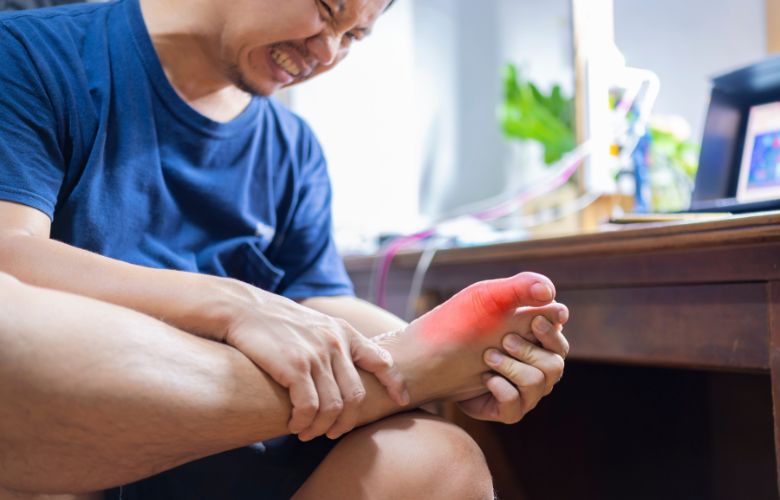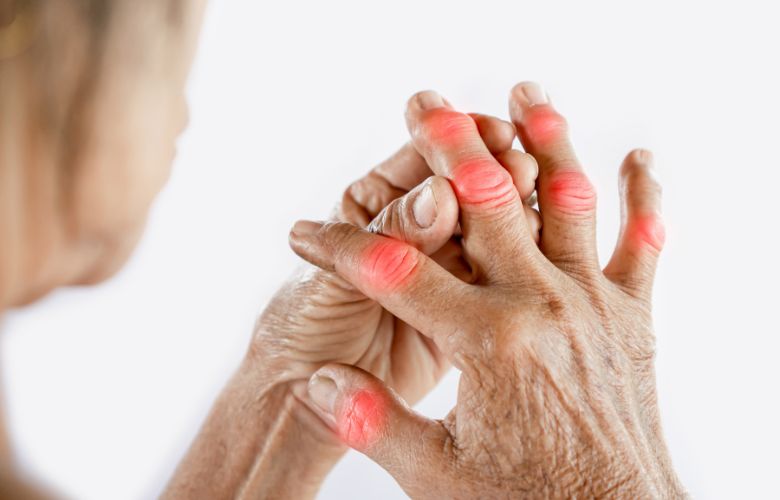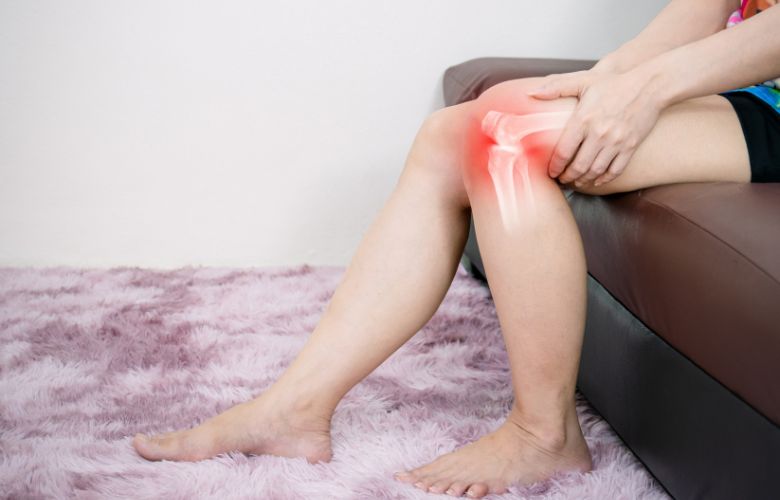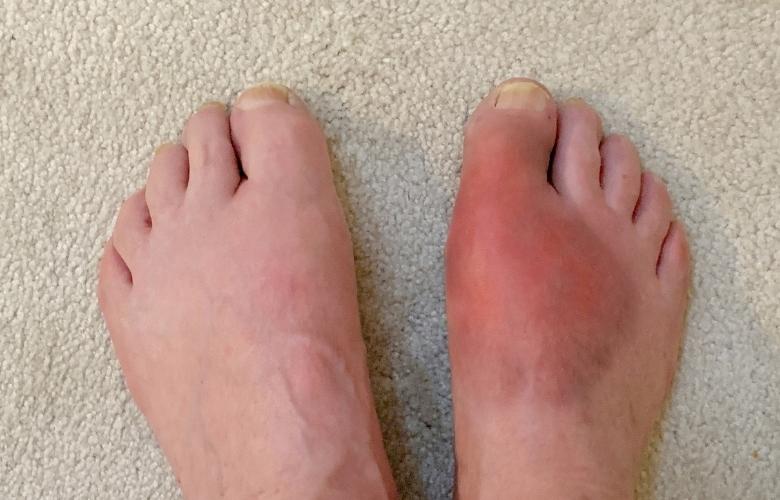Gout is a chronic disease that can affect anyone, but it is particularly common in males, overweight people, and those with a family history of the condition. It is a form of arthritis that can cause joints to swell, turn red, and experience abrupt, intense pain. It is caused by the accumulation of uric acid crystals in the joints, which over time can cause joint injury and inflammation. The risk rises for anyone who has to deal with insulin resistance, hypertension, kidney issues, congestive heart failure, and diabetes. Alcohol consumption can also cause gout, and so can some foods and liquids.
What is gout?

Gout is a very painful condition. It is a form of arthritis and it can occur suddenly. When an excessive amount of uric acid develops in the bloodstream, your symptoms will start to appear and will advance to your kidneys.
If the acid is being accumulated faster than the body is able to eliminate it, that will result in symptoms that are very painful. So when do you have to seek out gout treatment? If you feel any discomfort or pain, it might be time to visit your doctor. The symptoms can cause a lot of pain, swelling, redness, and the area can become tender.
Although gout can be extremely painful, it is curable with the assistance of a medical expert. Gout attacks can come on abruptly, frequently at night, and they can be very painful. Swelling, tenderness, and warmth to the contact may develop in the affected joint. Additionally, some individuals may get a fever or chills. We will go over the symptoms of gout when you need to see a doctor and the available treatments in this blog.
What Increases The Risk Of Gout?

When uric acid crystals build up in the joints, it results in gout, a painful type of arthritis that causes inflammation and excruciating pain. Men are more likely to develop gout, as well as people who are overweight. The risk rises for anyone who has to deal with insulin resistance, hypertension, kidney issues, congestive heart failure, and diabetes. Numerous factors that can affect a person’s chance of developing gout are mentioned below:
Genetics: Gout is more prone to strike members of one’s family than unrelated individuals. Gout growth is also influenced by age and gender. Gout affects males more frequently than women, and the risk rises with age.
Diet: It is yet another important factor that can raise the chance of developing gout. Purines are organic compounds that can be found in a variety of meals, including red meat, organ meats, seafood, and alcohol. The body converts purines and uric acid when this happens. An increase in blood uric acid levels brought on by a diet high in purine-rich foods can raise the risk of gout.
Obesity: Another risk factor for gout is obesity. Increased blood uric acid levels brought on by being overweight can raise the risk of developing gout. Additionally, gout is more likely to affect individuals with certain medical conditions like kidney disease, high blood pressure, and diabetes.
Medication: A number of medications have been shown to raise the chance of gout. For instance, diuretics, which are frequently used to address high blood pressure, can cause gout by raising the blood’s uric acid levels. By preventing the body from excreting uric acid, aspirin and other salicylates can also raise the chance of developing gout.
Dehydration: It can also raise the chance of developing gout. The danger of gout increases when the body is dehydrated because the kidneys are less able to remove uric acid from the body.
What Are The Symptoms?

A gout attack will usually affect one joint at a time. If that is not treated, then you can experience pain in other joints, as well. Attacks can be constant, or come and go. The gout attack will last from three to ten days, but you can feel better if you visit your doctor sooner. There are a couple of stages of gout, and it gets worse as the gout starts progressing. Keep an eye out for these symptoms.
- Sudden and Severe Pain: Gout attacks frequently start out unexpectedly and are followed by severe pain that can be incapacitating. It can be challenging to move or use the affected joint because of this pain, which is typically characterised as a deep, throbbing feeling. Even the weight of a bedsheet might be too much to endure due to the pain.
- Redness and Swelling: Gout attacks can result in redness and swelling in the affected joint, in addition to discomfort. The skin around the joint may feel warm to the touch and look inflamed. The joint’s shape may be altered by swelling that is too extreme to tolerate.
- Warmth: Gout is a form of arthritis that develops when the body’s uric acid levels are elevated because of crystals formed in the joints. The affected area may feel warm or hot as a consequence of the joint inflammation that these crystals can cause. The accumulation of uric acid crystals triggers an inflammatory reaction in the body, which is why touching the joint will make it feel warm or hot.
- Stiffness: Gout attacks can cause stiffness, making it challenging to move the afflicted joint. The performance of routine tasks like walking or holding items can become difficult as a result.
- Limited Range of Motion: Gout attacks can also restrict motion in the joint that is afflicted. The use of the afflicted joint is necessary for activities like typing or driving, which can be challenging to perform as a result.
- Sensitivity to Pressure or Tenderness: It is another common symptom of gout. The buildup of uric acid crystals in the joints can result in irritation, inflammation, and tenderness in the affected region. The tenderness can either be uniform throughout the joint or limited to a single area. The afflicted joint might feel sore to the touch, and pressing on it might be extremely painful. Discomfort can be brought on by even slight pressure, the weight of garments, or the presence of bedding.
- Fatigue or Fever: Even though it’s less frequent, some individuals who are having a gout attack may feel tired or experience a low-grade fever. Due to the inflammation brought on by the uric acid stones in the joint, the body’s immune system has responded in this way.
In addition to the big toe, gout can also affect the ankle, knee, wrist, elbow, and fingers. It’s essential to note that gout most frequently affects the joint at the base of the big toe. According to how long they last, gout episodes can last a few days to several weeks. If untreated, they can also come back over time. For a correct diagnosis and course of treatment, it’s crucial to see your doctor if you experience any of these symptoms.
Steps To Reduce The Risk

When the body’s uric acid levels rise, crystals may develop in the joints, causing pain and inflammation. This condition is known as gout. There are plenty of lifestyle changes which you can make that will help you in improving your overall health and well-being while lowering the possibility of getting gout. Here are some steps to take to reduce the risk of gout:
- Maintain A Healthy Weight: Keeping a healthy weight is important because being overweight or fat can make you more likely to get gout. The chance of gout can be reduced by losing weight through a healthy diet and exercise.
- Keep Yourself Hydrated: Drinking plenty of water and other beverages can help to flush uric acid from the body and lower the risk of developing gout. Aim for eight cups of water a day or more.
- Eat a Healthy Diet: Maintain a healthy diet and stay away from foods that are rich in purines like red meat, seafood such as shellfish, and organ meats as these can cause the body to produce more uric acid. Instead, concentrate on eating a diet full of fresh produce, whole grains, and low-fat dairy items.
- Limit Alcohol Consumption: Limit your alcohol intake because it raises your chance of developing gout, especially beer. Gout risk can be decreased by restricting alcohol intake or by abstaining from it entirely.
- Manage Other Medical Conditions: Gout is more likely to occur in people with diabetes, high blood pressure, and other conditions. Gout risk can be decreased by treating these diseases with medication, changing your diet, and exercising.
- Consult Your Doctor About Medication: Your doctor might recommend medication to lower your risk of gout attacks if you have a history of gout or are at a high risk of getting it. These drugs may include urate-lowering treatment or gout attack preventatives.
You should also make sure to have an active lifestyle since physical activity will provide you with a number of benefits. In addition to aiding your physical and mental health, exercise is important in helping you maintain a healthy weight. This will decrease the strain on your joints, hips, and knees.
When Should You Visit A Doctor?

Usually, if you are experiencing any kind of pain or discomfort for longer periods, it is recommended that you visit your doctor. If you are dealing with intense pain, redness, heat, and swelling, that usually means that gout might be the issue. It is important that you visit a physician if you are experiencing sudden waves of pain, especially if you also have chills or higher fever. If you’ve already experienced gout, there is a high chance that the condition will re-emerge sooner or later. This is called the gout flare, and it might not happen for a long time. However, whether it takes a year or just months to come back, it always comes back. This is why it is important that you visit your doctor the first time you feel pain.
It’s critical to seek medical attention as soon as you can because gout attacks can be excruciatingly painful and have a big impact on your everyday life. You should visit a doctor if you have gout symptoms, a history of gout, or other risk factors for getting gout, such as high blood pressure, diabetes, or kidney disease. Your medical professional can determine your total risk and offer suggestions for treating your ailment.
It’s important to keep in mind that gout can occasionally be confused with other conditions, such as rheumatoid arthritis or osteoarthritis, so it’s crucial to get a proper diagnosis from a medical expert. Your doctor can offer treatment choices after gout has been identified to help you manage your symptoms and lower your risk of future attacks.
How Can Your Doctor Help?

There is no cure for gout, but the condition can be managed and treated efficiently. Your physician will first have to observe your symptoms and do a couple of tests to make sure that the infection is actually gout, and not something similar. This can involve blood testing, testing of the fluids around the joint, and other tests. Keep in mind that if you feel any kind of discomfort or pain, it is important that you visit your doctor. You will be given a treatment plan tailored to your needs. So whether you need osteoarthritis treatment or gout treatment, you should always consult your physician.
To control gout, your doctor can offer a variety of solutions. A specialist can assist with gout in the following ways:
- Accurate Diagnosis: To identify gout, your doctor will conduct a physical examination and inquire about your health history and symptoms. To confirm the diagnosis, they might request imaging studies, joint fluid tests, or blood tests. Since other conditions can present with symptoms that are identical to gout, a proper diagnosis is necessary for efficient treatment.
- Medication: Your doctor may recommend one of several kinds of medications to treat the signs of gout. The discomfort and inflammation associated with gout attacks are frequently treated with nonsteroidal anti-inflammatory drugs (NSAIDs). An additional drug that can lessen the severity and length of gout attacks is colchicine. To lessen pain and inflammation, corticosteroids may occasionally be recommended.
- Lifestyle Changes: Changes in diet and exercise habits are just two examples of lifestyle modifications that your doctor can recommend to help you control your gout. They might advise people to consume more low-fat dairy products and complex carbohydrates while avoiding foods rich in purines, like red meat and seafood. Gout attacks can be prevented by drinking plenty of water, eating healthfully, and exercising frequently.
- Urate-Lowering Therapy (ULT): Your doctor may advise ULT if you experience frequent gout attacks or elevated blood levels of uric acid. With this therapy, the chance of developing gout attacks in the future is decreased by lowering uric acid levels in the body. Medications for ULT include probenecid, febuxostat, and allopurinol.
- Referral to a Specialist: Your doctor may occasionally suggest that you seek the care of a specialist to treat your gout symptoms, such as a rheumatologist or a podiatrist. While a podiatrist can assist with gout in the foot and ankle, a rheumatologist can offer specialised care for arthritis and related conditions.
- Monitoring: To ensure that your condition is properly handled and that your treatment plan is adjusted as necessary, your doctor will continuously check your uric acid levels and gout symptoms. Additionally, they might advise routine exams and blood tests to keep an eye on your health and adjust your therapy strategy as needed.
A variety of therapies and interventions can be recommended by your doctor to help you control your gout, lessen the frequency and severity of attacks, and enhance your general quality of life. You can successfully control your gout and avoid long-term joint damage by consulting with your doctor frequently and adhering to their advice.
Final Words
Gout is a form of arthritis that can result in abrupt, intense pain, swelling, and redness in the joints. It is brought on by a buildup of uric acid crystals in the joints, which over time can cause inflammation and joint injury. While some risk factors for the formation of gouts, such as genetics, age, and gender, cannot be changed, there are some lifestyle choices that can help to lower the risk. It is crucial to visit your doctor for a proper diagnosis and course of treatment if you are exhibiting signs of gout, such as sudden and severe joint pain, redness, and swelling. In addition to helping you manage your symptoms and avoid further gout attacks, your doctor can also track the condition’s development. Gout can be successfully treated with appropriate management, enabling you to lead a healthy and active existence. So, don’t forget to consult your doctor as soon as possible.


